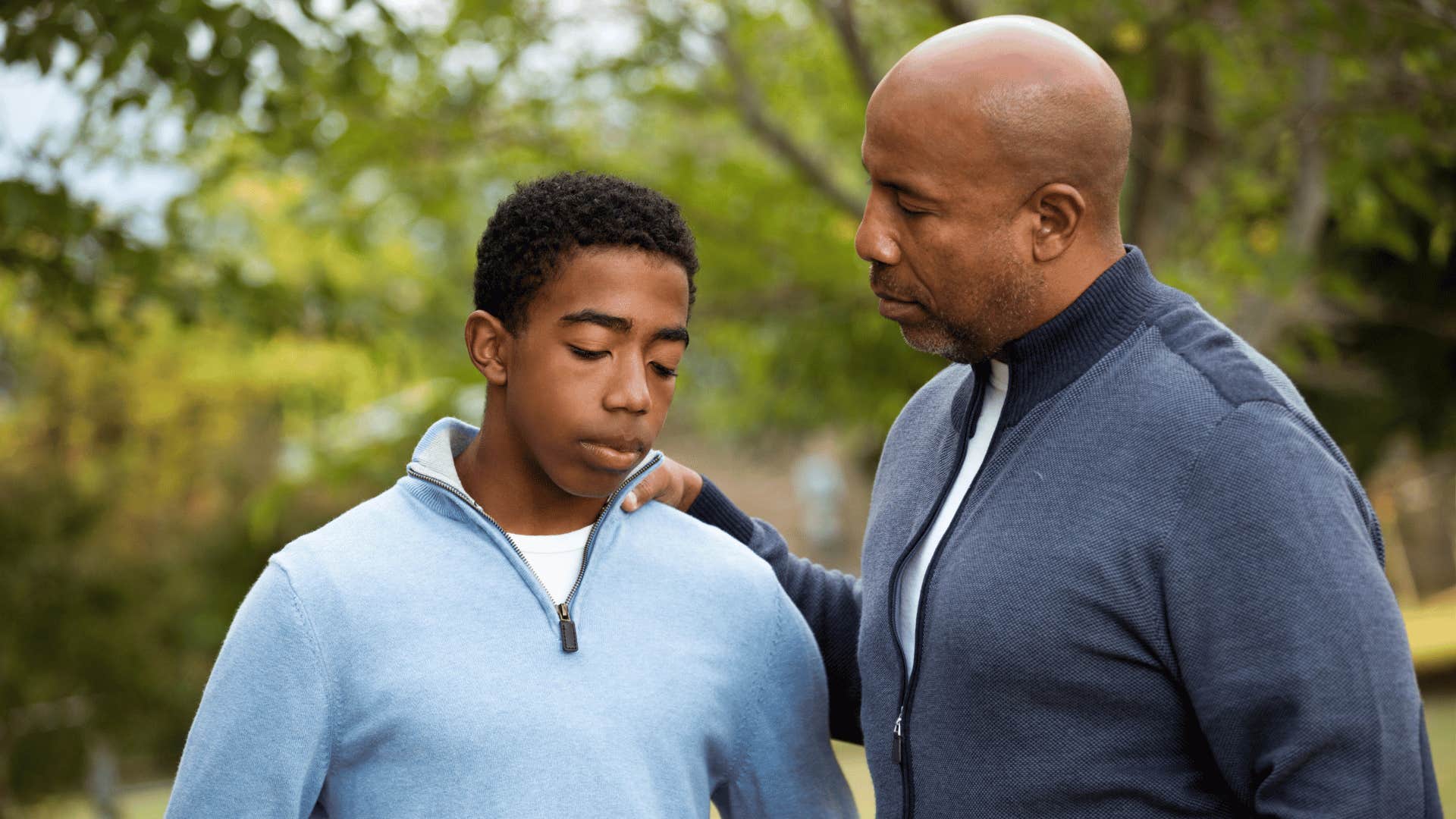11 Phrases People Say To Passive-Aggressively Criticize You
When someone constantly speaks to you from a place of indirect judgment because they're afraid to say what they think, it's extremely hurtful.
 Nicoleta Ionescu / Shutterstock
Nicoleta Ionescu / Shutterstock We've all known people who have plenty of thoughts and feedback they want to offer, but are so concerned with looking innocent that they won't share their feelings directly. In such cases, there are certain phrases people will use to passively-aggressive criticize you so they can express their judgments while seemingly maintaining their status as a "nice" person.
Being on the receiving end of this kind of passive-aggressive behavior can leave you feeling understandably confused. But if you hear things like this from someone fairly often, you can rest assured that they aren't trying to help, they only want to let you know they know better.
11 phrases people say when they want to passive-aggressively criticize you
1. 'I'm not saying you're wrong but...'
 fizkes | Shutterstock
fizkes | Shutterstock
The first phrase people say when they want to passive-aggressively criticize you is. "I'm not saying you're wrong but..."
Everybody has differences in opinion. Whether it's on a group project or making a decision within the context of a relationship, diversity in thinking will cause you to reach different conclusions than other people do.
That said, passively aggressively saying that someone isn't wrong and then following it up with the word 'but' isn't the best way to go. Not only is this phrase contradictory, but it also comes off as a bit hostile.
The next time you encounter a situation in which someone utters this phrase, don't be afraid to call them out. Otherwise, they'll continue thinking this behavior is okay, which won't be productive in future conversations.
2. 'I would've done it differently, but that's just me'
 Andrii lemelianenko | Shutterstock
Andrii lemelianenko | Shutterstock
Have you ever been in a discussion and had someone say, "I would've done it differently, but that's just me"? From the outside, this may not sound like much of a phrase to bat an eyelash at. After all, what's wrong with admitting a difference in opinion, right?
However, the issue with this phrase stems from the, "but that's just me” portion.
Being passive-aggressive often stems from people wanting to avoid conflict. Like it or not, passive-aggressive people are naturally avoidant as they don't want to cause a rift or make situations worse.
As a result, these people use indirect statements to express themselves. Unfortunately, this will often make the situation worse as they continue to hold in their frustration, causing resentment to brew in the process.
3. 'That's one way to do it'
 Krakenimages.com | Shutterstock
Krakenimages.com | Shutterstock
Another phrase people say when they want to passive-aggressively criticize you is, "That's one way to do it." Once again, everyone has a different way of doing things and there's nothing wrong with saying that.
That said, there's a respectful way to do things and a disrespectful way to do things, and snarkily saying, "That's one way to do it," is decidedly not respectful.
Not only is this phrase disrespectful, but it can make the other person feel isolated as well. According to the National Institute of Aging, isolation is no joke, as people who experience isolation are increasingly likely to also experience heart disease, depression, and cognitive decline.
Knowing this, if you catch someone being passive-aggressive, clinical psychologist Ellen Hendriksen Ph.D., stated that it's important to create a safe space for people to talk it out.
"Passive-aggressive people act the way that they do because they are afraid of how you’ll react," she said. So, be sure to tell them that you're more than willing to listen to their complaints, while also reminding them to keep it respectful.
4. 'Whatever works for you'
 fizkes | Shutterstock
fizkes | Shutterstock
Another phrase people use when they want to passive-aggressively criticize you is, "Whatever works for you." They might think this sounds at best nonchalant and at worst reluctant, not realizing how hurtful their veiled criticism really is.
But according to a study published in 2022, criticism can be especially hurtful, depending on the person it is coming from. Researchers found that getting criticism from people in higher positions of power, such as parents, grandparents, or bosses, is especially hurtful.
Regardless of who is delivering the remarks, researchers found that hurt feelings are still prevalent across all board.
If you ever feel offended or disrespected by someone else's passive-aggressive criticism it's important to be upfront. According to clinical psychologist Ryan Howes PhD, ABPP, "Relationships generally work better if all the cards are out on the table."
So, being upfront and saying something like, "Hey, I'd prefer you just be upfront with me because I feel disrespected when you aren’t.”
Now, is this always easy? Absolutely not. But doing this will certainly save time and most importantly, avoid misunderstandings in the future.
5. 'If you like it, I love it'
 Pheelings media | Shutterstock
Pheelings media | Shutterstock
When you’re trying on a new dress in front of your partner or showing your boss what you think is your best work, sometimes the other person will shake their head and respond with a curt, "If you like it, I love it."
It’s pretty obvious the other person is secretly judging you when they say this, which can have a direct impact on your self-esteem. According to a study in 2019, feeling judged based on appearance, for instance, increases your stress levels and depressive symptoms.
Though it might be uncomfortable, simply saying something like, "You can be honest with me," might be a smart move on your part. This allows someone to feel comfortable opening up to you. Additionally, it allows you to speak your mind without making them uncomfortable in the process.
6. 'We all have our strengths'
 pixelheadphoto digitalskillet | Shutterstock
pixelheadphoto digitalskillet | Shutterstock
The next phrase people say when they want to passive-aggressively criticize you is, "We all have our strengths." While it may be true that everyone has their strengths, saying this during a disagreement or intense moment isn't right. After all, what they're essentially saying is, "You're not particularly good at this."
According to a study in the Journal of Experimental Social Psychology, people who feel disrespected are more likely to be aggressive than those who feel disliked.
Despite this, you may feel more comfortable staying silent than stirring the pot. Though this is okay to do on occasion, it's important to stand up for yourself when people constantly criticize you. Otherwise, you allow them to get away with their hurtful behavior.
7. 'It's okay, I didn't expect anything else'
 PeopleImages.com - Yuri A | Shutterstock
PeopleImages.com - Yuri A | Shutterstock
According to the Gottman Institute, not only is contempt a form of resentment, but it is the number one predictor of divorce. And if you ever hear someone say, "It's okay, I didn't expect anything else," when they want to passive-aggressively criticize you, you should feel pretty alarmed, it is a sign of resentment and contempt.
People who are fed up won't always tell you how they feel until they are truly done with the relationship. With this in mind, you must take preventative measures to keep this from getting worse. Otherwise, you can lose the relationship completely.
Associate professor in Philosophy Susi Ferrarello Ph.D. suggested starting by acknowledging their pain while also not allowing yourself to succumb to guilt.
8. 'You do you, I guess'
 Prostock-studio | Shutterstock
Prostock-studio | Shutterstock
It can feel downright frustrating when people don't tell you what they really mean. Hiding their opinions behind seemingly nonchalant words and cool behavior can lead to a bucketload of misunderstandings.
According to a study in 2019, misunderstandings lead to confusion which lead to divisiveness and personal conflict.
That said, a phrase people say when they want to passive-aggressively criticize you is, "You do you, I guess." To some people, this might sound like the person in question doesn't care. However, deep down inside, this person is absolutely judging you — and you can feel it.
It's hard not to feel attacked by such petty behavior. As a result, you might quickly grow defensive as you begin to feel misunderstood, but it's important to collect yourself before responding. After all, allowing your frustration to boil over because of someone else's judgmental and dismissive behavior doesn’t help either of you.
9. 'At least you tried'
 Dean Drobot | Shutterstock
Dean Drobot | Shutterstock
It's always good to put in your best effort. Whether it's at school or at work, effort is worth a lot more than throwing in the towel and giving up. That said, it can feel extremely discouraging to hear someone say, "At least you tried."
Now sure, some might say this in hopes of cheering you up. However, many people say this when they want to passive-aggressively criticize you. In turn, this can make you feel even worse about failing than if they hadn't said anything at all.
So, what should you do if someone says this phrase? Once again, it's best to speak up and be honest about your discomfort. By saying something like, "I know you're trying to cheer me up, but it's not truly helping," you'll firmly address the issue while redirecting the person regarding what they shouldn't do in the future.
10. 'At least you aren't completely wrong'
 fizkes | Shutterstock
fizkes | Shutterstock
"At least you aren't completely wrong," is another phrase people say when they want to passive-aggressively criticize you. There's nothing more confusing than an indirect statement. On one hand, you might assume that the person is simply trying to be supportive, while on the other hand, you can feel their hostility.
A survey from YouGov found that 49% of people identify as people-pleasers. Because of this, it isn't shocking that so many people take the passive-aggressive route to tell others how they truly feel. Unfortunately, this type of behavior will only cause rifts in relationships.
Even so, it's not always your job to call someone out. If this is a one-time occurrence, letting bygones be bygones might sometimes be your best option.
11. 'I guess everyone has their own opinion'
 fizkes | Shutterstock
fizkes | Shutterstock
Finally, the last phrase people say when they want to passive-aggressively criticize you is, "I guess everyone has their own opinion.”
Again, diversity in thought is a great thing. For instance, according to a study in 2019, diversity increases production and improves performance. Even so, there is a correct way to address differences in opinion and an immature way.
Casually sulking and throwing in the towel isn't a good way to address differences in opinion. It's more productive to allow everyone to take a breather and come back to the conversation a few minutes later.
Now, is this a pain and will it sometimes result in pushback? Absolutely. However, refusing to address the issue will only make matters worse, causing resentment to quickly surface.
Marielisa Reyes is a writer with a bachelor's degree in psychology who covers self-help, relationships, career, family, and astrology topics.

